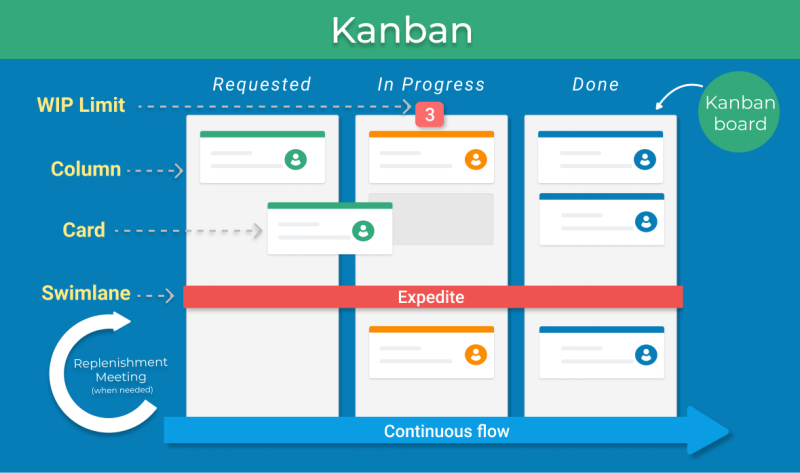What is a Program Manager?
A program manager is a senior-level practitioner of project management who orchestrates multiple related projects at the same time. They lead a program by attending to the program strategy, implementation, and delegation.
What is a Program?
For clarity, a project is a temporary, one-time undertaking with an expiration date and short-term, tangible outcomes.
A program, on the other hand, is long-term in nature, driving organizational growth. The program consists of multiple, interconnected projects. The success of the program is greater than the sum of each individually completed project it contains and supports a strategic business initiative.
Launching a new product, process, or company location are all examples of large, long-term programs that contribute to the upward growth trajectory of the company.
What is the Difference Between a Project Manager and a Program Manager?
A program manager usually has more seniority than a project manager. As such, a project manager role is a stepping stone to becoming a program manager.
With a bird’s eye view of a program and the projects that contribute to it, a program manager guides project managers to ensure they are working towards the program’s overarching goals.
While a project manager takes on a tactical role, the program manager is more strategic by shaping and aligning programs with broader organizational objectives.
Though their roles differ, program and project managers work closely on the overall progress towards program goals. The program manager’s high-level view complements the tactical day-to-day focus of the project manager’s role.
For more on their differences, read this: Program Manager vs Project Manager
Types of Program Managers
A program manager is not a uniform role, as various types serve an organization in slightly different ways, depending on the industry:
IT program manager: leads the IT team to implement new IT systems or strategic initiatives.
Non-profit program manager: designs programs that are in line with the non-profit’s mission, such as programs for fundraising and donor management.
Senior program manager: coordinates operational aspects of a program, such as hiring and training project managers, creating budgets, and solving conflicts.
Software program manager: implements and manages software development programs.
Responsibilities of a Program Manager
A program manager’s primary responsibilities include:
- Crafting, communicating, and implementing program’s objectives and strategies
- Managing multiple, related projects and project interdependencies that make up the program
- Planning for change and risks across all projects in the program
- Maintain program documentation
- Monitor and report on projects’ progress and changes
- Defining and measuring program success according to KPIs
- Overseeing and leading project managers
- Collaborating cross-functionally to manage program plan, budget, and resources
Program managers set the course for how to best complete a group of related projects. They then define the benchmarks to measure program success. With the end KPIs defined, the program manager streamlines internal processes and shores up the necessary resources to accomplish the program goals.
When the program is in full swing, the program manager collaborates cross-departmentally to ensure that projects unfold in the proper sequence and adhere to schedule, quality, and budgetary baselines.
Whom Does a Program Manager Work With and How?
A program involves many more roles than just the program manager, including:
- Project manager(s)
- Customer(s)
- Senior user(s)
- Planning coordinator(s)
- Senior leadership
- Developers
- Sales and marketing teams
- Finance and accounting teams
- managers
When a company is in the process of developing, prototyping, testing, and launching a new product, the program manager will know the right times to call on various internal stakeholders to weigh in.
For example, early in the process, the program manager will bring user experience, design, product managers, and DevOps together to coordinate on how to make the best product possible.
If a product takes longer than expected to release, the costs will likely be higher. The program manager will communicate the original and amended budget to finance and accounting.
Towards the end of the product development process, the program manager will increasingly communicate with sales and marketing on how to most effectively launch and promote the product.
s are part of a portfolio and projects are part of programs, so how is managing them different? Read more: Key Differences Between Project and Portfolio Management
What Does it Take to Be a Program Manager?
A program manager is a well-rounded, highly-skilled, and versatile professional who possesses the following skills, educational background, and experience.
Program Manager Skills
- Leadership
- Problem solving
- Critical, analytical thinking
- Organization
- Time management
- Strong verbal and written communication for presentations and proposal writing
- Adaptability in fast-paced environments
- Detail orientation coupled with big-picture thinking
- SQL and cloud programming
Program Manager Work Experience
Hiring managers tend to hire those with at least three to five years of work experience.
Through that hands-on experience, a program manager acquires certain knowledge, such as how to:
- Plan and execute a budget
- Resolve conflict
- Manage for risk and change in a program
Having a relevant educational background will help but experience is more important to those hiring to fill program manager roles.
Program Manager Educational Background
Educational requirements will vary for program manager roles, depending on the industry or type of project manager a company seeks.
Program managers require at least a bachelor’s degree typically in the area of business management or business administration.
However, for a software program manager, employers may desire a bachelor’s degree in computer science, computer engineering, or information systems.
A master’s degree in business, computer science, information systems, or a related field is a plus but will not necessarily command a higher salary.
How Much Do Program Managers Make?
In the US, program managers earn an annual average salary between $66,000 and $89,000 USD. The salary will depend on the experience level and the location.
The top paying cities in the US include Seattle, WA and Austin, TX.
Here are a few key ways program managers can increase their earning potential:
- Joining professional organizations, such as the Project Management Institute (PMI)
- Attending and networking at professional seminars, conferences, and events, such as the annual PMI Global Summit
- Obtaining a program management certification, such as the Program Management Professional (PgMP) or the Master Project Manager International certifications.
Some positions even require professional certification such as PgMP.
Even if it’s not required at the particular employer you want to work for, it’s a good idea to pursue the PgMP. While there is no direct link between obtaining the PgMP and increasing your earning potential, data suggests that certified program managers earn more. The average annual salary of a PgMP holder, $122,000 USD compared to the 66-89K range listed above.
Challenges of the Program Manager Role
Program managers are versatile and valuable team members necessary to project management. Like any role, program managers face obstacles in their day-to-day job:
- Project delays or overspending which has a downstream effect on subsequent projects in the program
- Miscommunication or misalignment between departments
- Managing what can be at times conflicting expectations above and below them in the hierarchy
- Interpersonal incongruence between the program manager and the project managers that directly report to them
To manage these obstacles, program managers must have the skills above which often come with work experience.
Are You Ready to Become a Program Manager?
Program managers are in a unique position to impact the long-term growth and direction of the company. They provide insight into how projects and programs play into strategic initiatives and add value to the organization. Companies with long-term, highly complex project clusters need and will benefit from a program manager.
Read next: How Much Do Program Managers Make?












